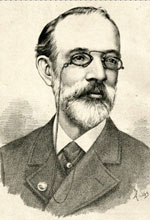Antonio de Serpa Pimentel
António de Serpa Pimentel (born November 20, 1825 in Coimbra , † March 2, 1900 in Lisbon ) was a Portuguese politician, professor and journalist from the time of the Portuguese monarchy. He was the leader of the Regeneration Party . Serpa Pimentel was a member of parliament and several times minister and from 1890 Prime Minister of Portugal . He shaped Portuguese financial and foreign policy in the late 1880s.
Serpa was one of ten children of the scholar and MP Manuel de Serpa Machado and his wife Ana Rita Freire Pimentel. He studied mathematics at the University of Coimbra , later he entered the Portuguese army, where he earned the rank of captain. In his youth, Serpa Pimentel sympathized with ultra-radical and ultra-democratic ideas, but later became a leading member of the Regeneration Party and in 1887 took over the party chairmanship from António Maria de Fontes Pereira de Melo, who had recently died .
Serpa played an important role in the Fontist government of António Maria de Fontes Pereira de Melo (1871–1877), in which he stabilized public finances, consolidated public finances, consolidated national debts, reformed the tax system and, by tapping into the important assets, immigrants from Brazil , reduced the Portuguese state's dependence on the financial center of London. In 1876, he had to master the country's first major economic and financial crisis, and in doing so, he earned the reputation of being one of the best economists in Portugal.
From 1881 Serpa acted as Portuguese Foreign Minister. At this time Portugal was involved in a momentous dispute with Great Britain over the Portuguese colonial areas in Africa . At that time Portugal only really controlled the coastal areas of its two large colonies, Portuguese West and East Africa (today's Mozambique and Angola ), but not the hinterland. The country was now pursuing the plan to expand the colonies in the hinterland so far that the two areas would touch, in order to create a coherent, large Portuguese colonial empire in Africa. In this context, it claimed large areas south of the Congo Basin for itself. Serpa tried to negotiate these claims with Britain as the plan clashed with British ideas that wanted to connect their colonies from Egypt to South Africa as well. He traveled to Berlin as a member of the Portuguese delegation to the Congo Conference , but as Prime Minister in 1890/91 had to take on the thankless task of bowing to a British ultimatum and thus foregoing the expansion of the colonial empire. In 1892 he took over negotiations with the creditor states of Portugal for the governments of José Dias Ferreira and Ernesto Rodolfo Hintze Ribeiro after the country had fallen into the deepest financial crisis of the 19th century.
Serpa was not only a politician, but he also left behind some works with social and political science considerations. They show a very detailed and deep understanding of social realities at the end of the 19th century and of the philosophical currents of that time. He was enthusiastic about the rapid scientific advances, was a supporter of Herbert Spencer's evolutionism and showed acceptance of the emerging ideologies of socialism and anarchism .
Works
- Questões de Política Positiva , Coimbra 1881
- O Anarquismo ea Questão Social , Lisbon 1898
Individual evidence
- ↑ a b c d J. Vic. S .: SERPA PIMENTEL, António de . In: José Costa Pereira (ed.): Dicionário enciclopédico da história de Portugal . tape 2 . Publicações Alfa, Lisboa 1993, ISBN 972-609-028-8 , p. 223 .
| predecessor | Office | successor |
|---|---|---|
| José Luciano de Castro |
Prime Minister of Portugal 1890 |
João Crisóstomo de Abreu e Sousa |
| personal data | |
|---|---|
| SURNAME | Serpa Pimentel, António de |
| BRIEF DESCRIPTION | Portuguese politician |
| DATE OF BIRTH | November 20, 1825 |
| PLACE OF BIRTH | Coimbra |
| DATE OF DEATH | March 2, 1900 |
| Place of death | Lisbon |
